1805 – “Great joy in camp we are in view of the ocean, this great Pacific Ocean which we been so long anxious to see. And the roreing or noise made by the waves brakeing on the rockey shores (as I suppose) may be heard distinctly.”
These words were written by William Clark after the Lewis & Clark Expedition sighted the Pacific Ocean for the first time.
1811 – The Battle of Tippecanoe, between U.S. forces led by Governor William Henry Harrison of the Indiana Territory, and Native American warriors associated with Shawnee leader Tecumseh, was fought near the Tippecanoe River in present day Lafayette, Indiana.
Harrison had marched with an army of about 1,000 men to disperse a confederacy of Native Americans. Tecumseh, not yet ready to oppose the United States by force, was away recruiting allies when Harrison’s army arrived. Tenskwatawa, a spiritual leader but not a military man, was in charge. Harrison camped near Prophetstown on November 6 and arranged to meet with Tenskwatawa the following day. Early the next morning, warriors from Prophetstown attacked Harrison’s army. Although the outnumbered attackers took Harrison’s army by surprise, Harrison and his men stood their ground for more than two hours. The Natives were ultimately repulsed when their ammunition ran low. After the battle, the Natives abandoned Prophetstown. Harrison’s men burned the town and returned home.
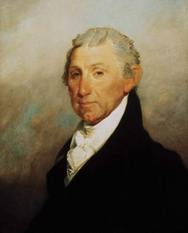
1820 – James Monroe, the 5th President of U.S., was reelected. Monroe was unopposed for the Democratic-Republican party nomination and ran unopposed in the general election. Monroe won the electoral votes of all 24 states and would have received all 232 votes if one elector from New Hampshire hadn’t cast his vote for John Quincy Adams. The reason (according to legend) was so George Washington would be the only president unanimously chosen by the electoral college.
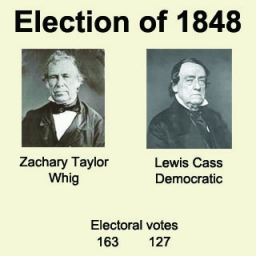
1848 – General Zachary Taylor, who had emerged as a hero of the Mexican War, defeated the Democratic candidate, Lewis Cass, and was elected the 12th President of the United States.
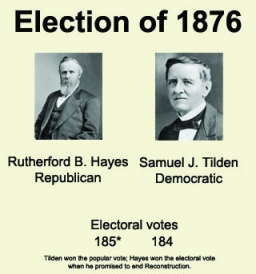
1876 – The results of the election between New York Governor Samuel Tilden and Rutherford B. Hayes, the Governor of Ohio, made it, up to that time, the most controversial in history. When the votes were counted, Tilden had won the popular vote, 4.2 million to 4 million. Even in previous elections in which the popular vote was close, the winner of the popular vote total was the winner in the Electoral College. Of the votes counted, Tilden had won 184 electoral votes, to 165 for Hayes. That wasn’t enough because the total was 369 and the winner needed 185. A total of 20 electoral votes had not been cast because of election disputes in Florida, Louisiana, Oregon, and South Carolina.
After some serious back-door wrangling, representatives in those states cast all of their electoral votes for Hayes, giving him the needed 185. This came to be known as the Compromise of 1877 because it resulted in the end of Reconstruction and the withdrawal of federal troops from the South. The Democratic Party had given up a short-term gain (the presidency) in exchange for a long-term gain.
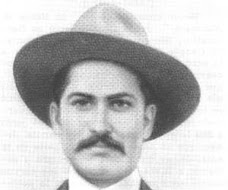
1907 – Jesús García, a Mexican railroad brakeman, was killed trying to keep a train loaded with dynamite from exploding near Nacozari, Sonora, Mexico. The train was stopped in the town, on its way to Douglas, Arizona, when García noticed hay on the roof of a car containing dynamite had caught fire. He drove the train in reverse downhill at full-steam out of the town before the dynamite exploded, killing him and sparing the population of the mining town.
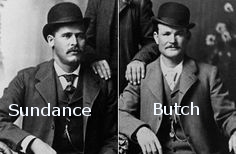
1908 – Robert Leroy Parker (better known as Butch Cassidy) and Harry Alonzo Longabaugh (Sundance Kid) died (allegedly) in a shootout in Bolivia.
1940 – Only four months after its completion, the Tacoma Narrows Bridge in Washington State suffered a spectacular collapse. When it opened, the Tacoma Narrows Bridge was the third-longest suspension bridge in the world. Built to replace the ferry system that took commuters from Tacoma to the Gig Harbor Peninsula, the bridge spanned 2,800 feet and took three years to build.
Experts still disagree on the exact cause of the bridge’s destruction, but most agree the collapse was due to wind-induced vibrations.
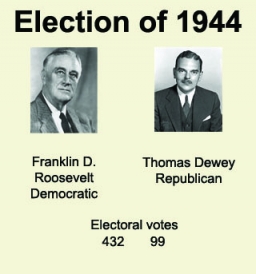
1944 – With World War II still raging, and with the success of the D-Day invasion fresh in voters’ minds, President Franklin Roosevelt ran for a fourth term and soundly defeated Republican Thomas Dewey.
1944 – Richard Sorge, a half-Russian, half-German Soviet spy, who had used the cover of a German journalist to report on Germany and Japan for the Soviet Union, was hanged by his Japanese captors.

1957 – The final report from a special committee called by President Dwight Eisenhower to review the nation’s defense readiness indicates that the U.S. was falling far behind the Soviets in missile capabilities, and urges a vigorous campaign to build fallout shelters to protect American citizens.
Headed by Ford Foundation Chairman H. Rowan Gaither, the committee concluded that the United States was in danger of losing a war against the Soviets. Only massive increases in the military budget, particularly an accelerated program of missile construction, could hope to deter Soviet aggression. It also suggested that American citizens were completely unprotected from nuclear attack and proposed a $30 billion program to construct nationwide fallout shelters.
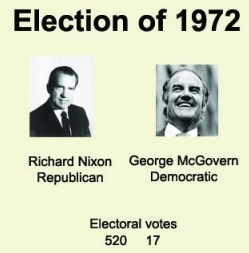
1972 – President Richard Nixon easily won re-election with a landslide win over South Dakota Senator George McGovern. With only 55 percent of the electorate voting, the lowest turnout since 1948, Nixon carried every state but Massachusetts, taking 97 percent of the electoral votes.
McGovern had said during the campaign, “If I were President, it would take me twenty-four hours and the stroke of a pen to terminate all military operations in Southeast Asia.”
He said he would withdraw all American troops within 90 days of taking office, whether or not U.S. prisoners of war were released. To many Americans, including many Democrats, McGovern’s position was tantamount to total capitulation in Southeast Asia. Given this radical alternative, Nixon seemed a better choice to most voters.
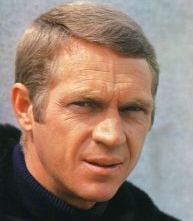
1980 – Actor Steve McQueen (The Magnificent Seven, The Great Escape, The Sand Pebbles, Papillon, Bullitt, The Towering Inferno, Wanted: Dead Or Alive) died of cancer at the age of 50.
1983 – An explosion tore through the second floor of the United States Capitol north wing. Minutes before the blast, a caller claiming to represent the “Armed Resistance Unit” had warned the Capitol switchboard that a bomb had been placed near the Chamber in retaliation for recent U.S. military involvement in Grenada and Lebanon.
The force of the device, hidden under a bench at the eastern end of the corridor outside the Chamber, blew off the door to the office of Democratic Leader Robert Byrd, and sent a shower of pulverized brick, plaster, and glass into the Republican cloakroom. The explosion caused no structural damage to the Capitol, but a portrait of Daniel Webster received the explosion’s full force. The blast tore away Webster’s face and left it scattered across the floor in one-inch canvas shards. Over the coming months, a conservator painstakingly restored the painting to a credible, if somewhat diminished, version of the original.

1983 – David Hendricks, a businessman traveling in Wisconsin called police in Bloomington, Illinois, to request that they check on his house and family. According to Hendricks, no one had answered the phone all weekend and he was worried. When the police and neighbors searched the home the next day, they found the mutilated bodies of Hendricks’ wife and three children, all of whom had been hacked to death with an ax and butcher knife.
Because there was very little sign of a struggle or forced entry, police thought the crime scene was suspicious. In addition, though the killings were brutal, the murder weapons had been cleaned and left neatly near the bodies. When Hendricks returned later that day, police questioned him and checked his clothes and car for bloodstains. But the search was inconclusive, and Hendricks’ alibi – that he had left for Wisconsin just before midnight on November 4 – appeared solid. He claimed that he had taken his family out for a pizza at about 7:30 on November 4. According to him, they then played in an amusement area and returned home at 9:30. Hendricks left for his business trip several hours later.
But after studying the children’s bodies, medical examiners concluded that Hendricks’ story did not quite fit. Ordinarily, food leaves the stomach and moves into the small intestine within two hours. However, in all three children, vegetarian pizza toppings were still in their stomachs, which led investigators to estimate their time of death sometime around 9:30 – while Hendricks was still at home.
Police charged Hendricks with murdering his family, but they still lacked a concrete motive. The Hendricks family was devoutly religious, belonging to a puritan-like group called the Plymouth Brethren. Hendricks’ defense attorney hammered away at the only physical evidence against him, pointing out that physical activity or trauma can affect the rate of digestion. Still, the jury found Hendricks guilty of four counts of murder and he was sentenced to life imprisonment on December 21, 1984.
Hendricks’ conviction was overturned by the Illinois Supreme Court, which ordered a new trial, and in 1991, Hendricks was acquitted at the second trial.
1989 – Former Manhattan borough president David Dinkins, a Democrat, was elected New York City’s first African American mayor, while in Virginia, Lieutenant Governor Douglas Wilder, also a Democrat, became the first elected African American state governor in American history.

1991 – Basketball legend Earvin “Magic” Johnson stunned the world by announcing his sudden retirement from the Los Angeles Lakers, after testing positive for HIV, the virus that causes AIDS. At the time, many Americans viewed AIDS as a gay white man’s disease. Johnson, who is African American and heterosexual, was one of the first sports stars to go public about his HIV-positive status.
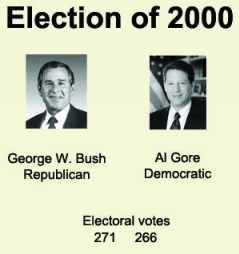
2000 – Vote counting went deep into the night; by the next day, every state but Florida had a declared winner. At that time, Vice President Al Gore had won 20 states and D.C., giving him 266 electoral votes, and Texas Governor George W. Bush had won 30 states, giving him 246 electoral votes. Florida’s votes were yet to be finally counted, and the 25 electoral votes for that state would determine the winner. When the final tally was initially announced, Bush was ahead by less than 1,000 votes (out of nearly six million votes cast). Florida state law required that a difference that small be followed up with a recount, by machine. Gore requested a recount by hand in four counties.
The process became an endless parade of legal motions, and the result was a series of legal decisions that culminated in a December 12th U.S. Supreme Court decision that halted all vote-counting, with the result that Bush won Florida, and the election.
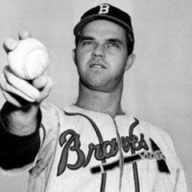
2006 – Former Major League pitcher Johnny Sain (best known for teaming with left-hander Warren Spahn on the Boston Braves teams from 1946 to 1951) died of natural causes at the age of 89.
In 1948, Sain won 24 games for the Braves, and he and Spahn achieved joint immortality that year when their feats were the subject of sports editor Gerald V. Hern’s poem in the Boston Post. The short version was simply “Spahn and Sain and pray for rain,” but the full version went like this:
“First we’ll use Spahn
then we’ll use Sain
Then an off day
followed by rain
Back will come Spahn
followed by Sain
And followed
we hope
by two days of rain.”
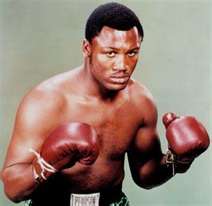
2011 – Former heavyweight boxing champion “Smokin'” Joe Frazier died of liver cancer at the age of 67.
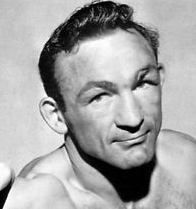
2012 – Former welterweight and middleweight boxing champion Carmen Basilio died of natural causes at the age of 85.
Compiled by Ray Lemire ©2014 RayLemire.com. All Rights Reserved.
You may not, under any circumstances, reproduce, record, publish, republish, post, transmit, publicly display, publicly exhibit or distribute any articles or photographs on RayLemire.com without obtaining the express written consent of the Operator.